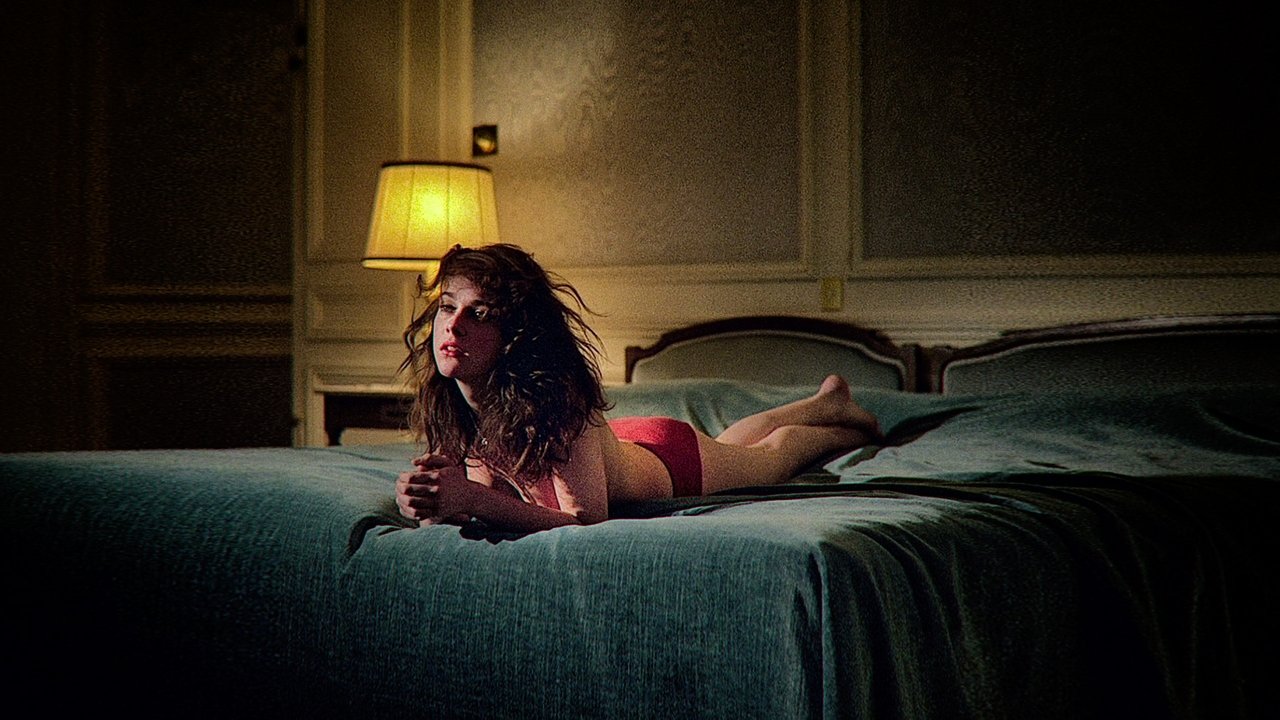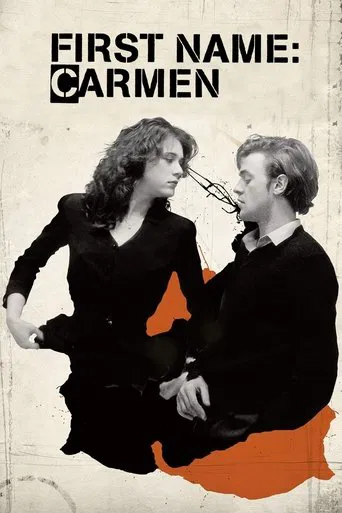

Purely Joyful Movie!
... View MoreMost undeservingly overhyped movie of all time??
... View MoreBeautiful, moving film.
... View MoreThe film's masterful storytelling did its job. The message was clear. No need to overdo.
... View More"The human being under the skin is, for all lovers, a horror and unthinkable, a blasphemy against love." - Nietzsche Jean-Luc Godard's "First Name: Carmen" opens with lines of cars and trains travelling in opposite directions. We then cut to roiling waves. "It's in me, in you, like terrible waves," someone says, later identified as Claire (Myriem Roussel), one of a string quartet busy rehearsing Beethoven. We then cut to a mental hospital. Here rests Godard, who plays himself within the film. Broke and so feigning illness for board and bed, he sits before a typewriter. The lights dim.What follows is a fantasy spun by the now sleeping Godard. Here he imagines the movie he'd have made with his niece, a girl whom he "always adored" and whom he "always wanted to make a film with". His niece's name is Carmen (Maruschka Detmers), and so he casts her in a stylised version of Georges Bizet's "Carmen", a nineteenth-century opera. "Should I ask why you're here?" Carmen asks, when she's conjured before Godard. "Sure," he self-reflexively replies, "it'll provide some dialogue." Within this film within a film, Carmen plays a criminal who robs banks, falls in love with a soldier (Joseph) and stages a movie production as cover for yet another heist. Significantly, she films this fake movie with "Godard's new camera" which we learn "makes music". "Name's" aesthetic itself attempts to mimic the ebbs, flows and logic of Opera, dance and classical music. Carmen's tale is also framed by Claire's music recitals, with the moods and rhythms of the former influencing the latter, and vice versa. "Be mysterious!", "Develop tragedy!", "Improvise!" Claire's associates say, orders which Carmen herself obeys.Still, the film's central character remains the oft off-screen Godard. Throughout the film, Carmen becomes emblematic of a fantasy image which he repeatedly creates and yearns for. She's "the first name": the fantasy that exists before actual identity. As men approach, Carmen recedes, as they move close, she disappears, a push-pull dynamic encapsulated by Godard's cutaways to turbulent ocean waves. These waves appear throughout the film, crashing and churning like we imagine the on-screen Godard tosses and turns in his own bed.Significantly, it is the clichés and conventions of cinema which prevent Carmen and Joseph being together. The closer he gets, the quicker she runs off on some ridiculous adventure. She remains in the realm of cinema, desire, love and longing, he in the realm of flesh and disappointment. Throughout the film, suffering and joy ritualistically dance, but power itself is continuously constructed and deconstructed; Carmen's never just a fetish object upon which Joseph, or the spectator, exerts power. In her own way, she asserts her own control, her own tidal forces.Unable to possess her, Joseph finally explodes into rage. He masturbates frantically over her image and then pathetically collapses. Desires cannot be satiated, only transferred. Epitomizing this is the film's obsession with "holes", an allusion to a very male drive to meet and go beyond desire; to transcend Lack, eradicate desire and penetrate into a "beyond". "Now I know why jail is called a hole," the soldier says, alluding to female orifices (vagina, anus etc), but also the trap of all yearning. The film itself begins with Godard wishing to "put his finger in a nurse's anus for 33 seconds" and ends with a "hole in Godard's jacket being sewn" by the very same nurse. "That's a long 33 seconds," he then quips, referring to the film he's trapped in, a feature length orgasm in which longings are patched up and desires temporarily postponed.For Godard, cinema, directors and men in general, are hopelessly fetishistic, always aroused by the mysteries of the female body. Their gaze is itself helplessly dependent, masochistic, misogynistic, exploitative, unashamedly masculine but ultimately impotent. There is nothing except desire for desire.But if Carmen exists in a world defined by men, trapped in a game of repetition and return, Claire exists in another realm. Spiritual, contemplative and sombre, she's detached from the carnal world of Carmen. We also learn that she too was once in love with Joseph, a man who eventually abandoned her. If Carmen's tale presents the male ego's experience of love, loss and impossibility, Claire represents the female flip-side. She's the victim of Godard's camera, conjured up and then discarded, left to contemplate the cruel eyes which regard her as inadequate."Carmen" is almost impenetrably symbolic. Trains and ships travel in opposite directions, signalling the widening gaps between our characters, and only when traffic streams merge do our guys and girls come together. Elsewhere Joseph caresses a TV, hoping to penetrate its screen and get at the fantasies within. This recalls what Rene Girard termed "memetic desire"; far from being autonomous, human desires are borrowed from other people and places. The film's aesthetic also alludes to Godard's previous films, alternating between pulpy crime clichés and political tracts. Other sequences feature Godard in a little symbolic tale. Here he's a failed director who has "lost everyone's money" and who now serves as a doormat for hip upstarts who use him to steal cash from unsuspecting audiences (with crime film clichés, no less). This refers to both Godard's return to feature film-making, and his refusal to bow to public and financial pressures."Carmen" was the second film in Godard's "body quartet" ("Slow Motion", "Passion", "Carmen", "Hail Mary", the latter also with a Joseph). It ends with the words "sunrise"; morning comes and the cranky dreamer awakes.7/10 – Multiple viewings required. See Antonioni's "Beyond The Clouds" for this material done better.
... View MoreAs happens more with Godard, it's not easy to lay a finger on 'Prenom: Carmen' (= French for 'First name: Carmen'). Although the film appears to be chaotic, it somehow is kept together by a number of invisible strings.Anyway, the very pleasant & often repeated bottom lines are made by a classical chamber orchestra, as well as by shots of sea-waves breaking themselves on the coast.In between the meager plot develops in a sequence of varying scenes, even including a touch of slapstick. However, in the end one cannot escape the conclusion that 'Prenom: Carmen' needs to be supported by Maruschka Detmer's frequent nudity to leave a more lasting impression.
... View MoreFirst Name: Carmen is an enthralling hybrid for director/actor Jean-Luc Godard and screenwriter (and frequent collaborator) Anne-Marie Mieville. After almost a decade of weird, philosophical experimentation, they took on the opera of Carmen (the original story of which, unfortunately, I am not very knowledgeable of) and deconstructed it with some amusing self-awareness ("Uncle" Jean-Luc Godard at the start of the film is in a hospital of sorts, over-staying his welcome), while going back to Godard's olden days of movies with lovers on the run. This time the lovers meet by accident and chance- Carmen X (the alluring and dangerous Maruschka Detmers in a controlled, if downtrodden debut acting role) asks of her uncle Jean if she can use his beach-side house to make a film with some friends. He agrees, though not knowing she's apart of a terrorist gang that robs a bank. During the robbery she has a shoot-out, and kiss, with Joseph (Jacques Bonnaffe, whose performance shifts from bizarre to intense and then believable) the security guard. They hide out for a little while, becoming more involved, while Carmen knows at the same time his uncle prepares to make his comeback film after being washed up for so long, her terrorist friends are planning another scheme.The acting ranges from forceful to observant, from a little boring to a little ridiculous, but like in Godard's 60's films the actors contribute to Godard's documentary style feel (of which he calls a documentary which is 'fictional'). And Godard is able to get a few laughs during his few scenes on camera, even as he spouts a few quotes that make a viewer dig in their minds for a meaning. Accompanied with evocative and sweet late-night shots of cars and a train in Paris, are shots of the ocean, which contributes as the film's main flaw for me (I kept on saying, yeah the sea looks nice, but what's the point he's getting at here- is it the characters or himself that likes staring at the sea?). Nevertheless, the compositions are no less than on par with what to be expected from Godard (via the great Raoul Coutard and Jean-Bernard Menoud), and the emotionally charged musical selections from Beethoven and Bizet to Tom Waits are pulled off as a successful, often emotional experiment as the footage of the string musicians are inserted several times. Overall, 'Carmen', however little or much it follows it's source, is a fine piece of art-type of cinema, where romanticism and cynical humor plays as much of a role as the story.
... View MoreI've seen this once, which isn't really enough, but I found it the most sheerly enjoyable of Godard's later works. A kaleidescopic updating and deconstruction of the "Carmen" story, it's "Carmen", it's "Last Tango in Paris", it's a girl and a gun, it's the Keystone Kops, it gives us Godard as randy old pervert and it's informed throughout by Beethoven's beautiful late string quartets, which this film made me start listening to. It's also screamingly funny.I will admit to understanding about a tenth of this and Godard's later work is so personal that it's probably futile to hope that everything will become clear, but I shall see this again as soon as I get the chance. Hal Hartley (and Tarantino) eat your heart out....
... View More